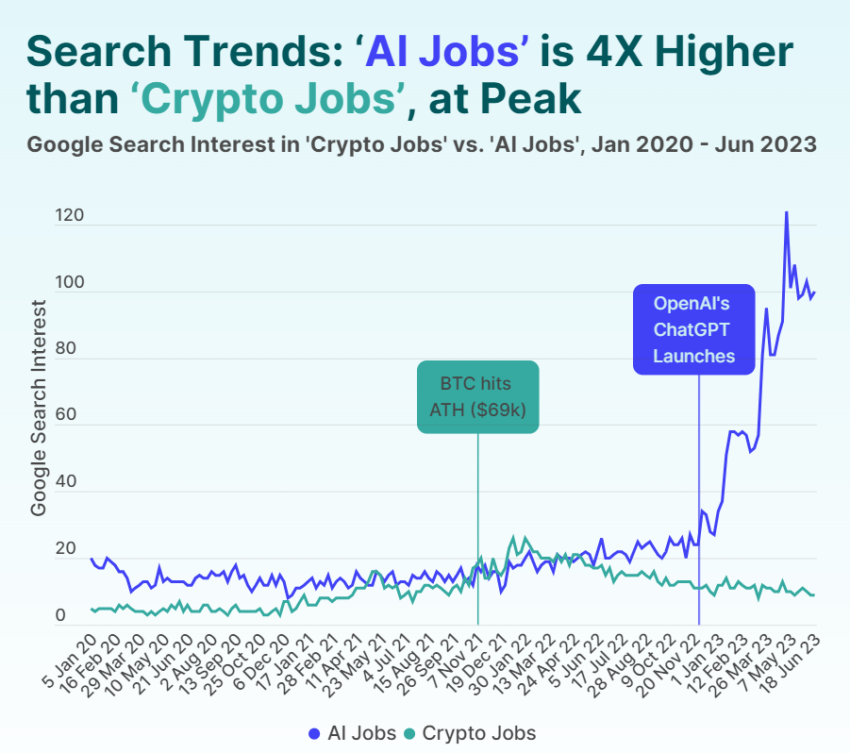AI is no longer just tech jargon. From guiding students with personalized lessons via virtual tutors to forecasting global trends before they even hit the newsstands, AI is asserting its influence on the very fabric of our daily lives. So, it’s hardly surprising that jobs in AI have become a hot topic of discussion in professional circles worldwide. While there’s chatter about AI snatching away jobs, many miss the silver lining: AI’s potential to enhance existing roles and even spawn entirely new ones. Here’s a look at top jobs in AI making waves in 2024.
In this guide:
Sought after skills for jobs in AI

AI isn’t just a single discipline; it’s a mix of computer science, math, and engineering. Think of it as a flexible tool capable of handling and molding everything from chatting with us in human-like lingo (thanks to Natural Language Processing) to making quick, logical decisions with algorithms.
At the heart of AI’s genius is machine learning. It’s the art and science of teaching machines to learn from data and then predict or decide based on that intel. This foundation enables AI models to recognize patterns, foresee outcomes, and grow rich in data with each interaction.
Now, if you’re aiming big for a career in AI, you have some preparation to do. Machine learning demands fluency in languages like Python, R, and MATLAB and a solid grip on frameworks like TensorFlow and Keras. And for those keen on making AI systems that can chat about the weather or your favorite book, there’s Natural Language Processing (NLP). This involves understanding human chatter, dissecting text, and creating responses that sound human.
NLP mastery requires a strong working knowledge of Python and Java. Additionally, some experience with tools like NLTK and spaCy can be beneficial, too. AI thrives on data (lots of it!), and data science chops are crucial. This means you’ll be extracting, analyzing, and visualizing data, armed with Python, R, SQL, and tools like Pandas and NumPy.
Broadly speaking, currently sought-after AI job skills include:
- Machine learning
- Natural Language Processing (NLP)
- Data science
- Deep learning
- Computing
- Robotics
- Problem-solving
Having these skills in your arsenal sets you up for some of the most exhilarating roles in the tech industry.
Find your dream job
Connect with your true soulmates in Web3
Which field of AI is in demand?
“The future is ours to shape. I feel we are in a race that we need to win. It’s a race between the growing power of the technology and the growing wisdom we need to manage it.”
Max Tegmark, physicist: Washington Post
The World Economic Forum’s “Future of Jobs” report predicted that 97 million new jobs would likely be added to the job market by 2025. A substantial chunk of that number is expected to be jobs directly or indirectly associated with AI due to its growing relevance across industries.
CoinGeckoGecko’s data spills some tea: “AI Jobs” searches on Google exceed “Crypto Jobs” by about four times. And that includes web3 jobs too, which are comparatively high in demand these days.

The AI search frenzy started around November 2022, likely thanks to OpenAI dropping ChatGPT. By April, the search interest score for AI jobs hit a whopping 124 before cooling down to a still impressive 100 in June 2023. Now, let’s rewind to bitcoin’s valuation peak in November 2021. Even with all that buzz, its job search interest score barely touched 30. Here are our top picks for the best AI-geared jobs in 2024.
Top jobs in AI in 2024

1. Machine learning engineer
Machine learning engineers are like the backbone of the AI industry. They juggle software skills and data science and decode languages that aren’t even human. If you’re someone who loves data, knows a bit of research, and can code in Java, Python, or Scala, this might be your calling.
Aditionally, if you’ve played around with tools like Eclipse or IntelliJ, you’re already ahead of the game.
Payday: A not-too-shabby $151K, says Glassdoor. Land a gig at a tech giant like Google or Meta, and you could be looking at upwards of $200k to $244k.
/Related
More ArticlesThe ideal candidate: Companies want the crème de la crème: folks with advanced degrees in computer science or math, along with a flair for programming in Python, Java, and Scala. Got a machine learning certification? That’s an added plus! Here’s a checklist of some of the sought-after skills:
- A degree in computer science, data science, or something similar.
- Python, R, or Java experience.
- Knowledge of machine learning algorithms.
- Enough experience playing around with TensorFlow, PyTorch, or Keras.
- A solid grip on data cleaning and preprocessing.
- Some knowledge in stats, algebra, and calculus would count for an excellent foundation.
2. Data scientist
Data scientists guide organizations by pinpointing the right questions and then diving into vast pools of data to find the answers. They create models that predict future trends and outcomes. They are also responsible for using machine learning to enhance data quality or refine product offerings.
Payday: On average, the base pay is $152k per year, according to Glassdoor.
The ideal candidate: Most data scientists boast advanced degrees, and while a computer science background is ideal, it’s not a deal-breaker. The highly sought-after candidates have a solid grip on tools like SAS, R, and the Hadoop platform.
The primary qualifications include:
- A higher degree in fields like computer science, mathematics, or statistics.
- A knack for grappling with unstructured data and conducting statistical evaluations.
- Hands-on experience with cloud platforms, notably Amazon S3, and familiarity with the Hadoop ecosystem.
- Coding skills in languages such as Python, SQL, Scala, and Perl.
- Proficiency in tools and platforms like Hive, Spark, MapReduce, Pig, and, of course, Hadoop.
But it’s not always about tech skills; a curious mind, top-tier communication skills, and a dab of business skills make candidates stand out in the AI crowd.
3. Natural language processing engineer
Natural Language Processing (NLP) engineers focus on enabling computers to understand and interpret human language, both spoken and written. These specialists utilize tools for speech recognition, semantic extraction, sentiment analysis, and more to transform unstructured language data into structured formats that machines can process.
Hence, while most of us struggle with autocorrect, these experts teach machines the fine nuances of our language. They often collaborate with other tech experts to develop systems like voice assistants and document processors.
Payday: As for their paycheck, NLP engineers average around $95k/yr, with the seasoned experts raking in over $120k per year — to the tune of $142k, according to Glassdoor.
The ideal candidate: A background in computational linguistics, computer science, mathematics, or statistics is typically preferred for this role. Familiarity with Python, ElasticSearch, and web development can be advantageous.
The primary qualifications for an NLP engineer consist of:
- Building and fine-tuning NLP systems based on specific needs.
- Converting natural language data into actionable insights using optimal text representations.
- Ensuring the NLP systems align with set requirements.
- Conducting training sessions for the model and evaluating its performance.
- Identifying and utilizing the most appropriate algorithms and tools for NLP challenges.
- Analyzing outcomes statistically and making necessary model refinements.
- Staying abreast of the latest trends and advancements in machine learning.
- Overseeing the upkeep of relevant NLP libraries and frameworks.
4. Robotics engineer
Robotics engineers have been at the forefront of the AI world since the 1950s when industrial robots first hit the scene. Fast forward to today, and robots aren’t just assembling stuff; they’re teaching English and assisting in surgeries. Heck, some even dream of being your personal assistant! The mission of a robotics engineer is to turn these sci-fi dreams into reality. To nail this role, you’ll need a solid background in engineering or computer science, a bit of AI and machine learning know-how, and some hands-on experience in stuff like CAD/CAM, 3D vision, and IoT.
Payday: The average base pay, is somewhere around $95k/yr. As with any other trade we are discussing here, the salary can be significantly larger depending on your experience and the organization you work for.
The primary qualification for a job in AI and robotics include:
- A background in robotics, mechanical, electrical, or computer engineering.
- Proficiency in languages like C++, Python, or MATLAB.
- Hands-on experience with CAD tools for designing robotic systems.
- A deep understanding of control systems and various sensors.
- Experience with microcontrollers and PLCs.
- A grasp of artificial intelligence and machine learning concepts.
- Real-world exposure to robotic systems and their applications.
- Knowledge in kinematics, dynamics, and control theory.
- Familiarity with safety protocols and standards in robotics.
5. AI product manager
While traditional product managers might be responsible for UX or marketing, an AI product manager typically charts courses through data processing and statistics. Their mission is to oversee the creation and launch of AI products.
Put simply, they’re the glue holding together diverse teams – from engineers and data scientists to marketers and business experts. Their goal is to ensure that not only does an AI product meet customer needs but also embodies the company’s ethos.
They’re the ones who settle the product vision, lead market research, prioritize features, and oversee the entire product journey from that initial spark of an idea to its launch. Additionally, they’re also the ones setting KPIs, measuring product success, and ensuring they’re always in the loop with the latest AI tech and trends. Plus, they have to ensure that their product is on the right side of the law, too.
Payday: On average, the base pay is around $133k/yr, but can go up to $183k/yr.
If you’re aiming for a job in AI as a product manager, here’s a checklist to see if you’ve got what it takes:
- A deep understanding of artificial intelligence and machine learning.
- Excellent communication skills to bridge the gap between techies and non-techies.
- Leadership qualities to steer cross-functional teams.
- A solid grip on data analysis to make informed product decisions.
- Strategic thinking to spot and prioritize AI product opportunities.
- Problem-solving ability to tackle technical challenges.
- UX design knowledge to ensure the product is user-friendly.
Computer vision engineers
Computer vision engineers bridge the digital and the real visual world. They’re not just making computers “see” but are enabling them to interpret and act on what they see.
Remember the UPC readers in supermarkets that beeped every time an item was scanned? That’s an early example of computer vision. Fast forward to today, and we have self-driving cars, facial recognition systems, and AI-driven medical diagnostics, all thanks to the advancements in computer vision.
Computer vision engineers typically deal with vast amounts of visual data, be it from video feeds, digital signals, or even analog images. Their job is to transform this data into actionable insights. They’re the brains behind the tech that can zoom into blurred images and sharpen them, search for images on the internet, and even moderate content on social media platforms.
Payday: The average base pay is around $155k/yr, as per the latest data from Glassdoor.
To land a job in AI as a computer vision engineer, you need to meet the following criteria:
- Proficient in computer science concepts and machine learning tools like TensorFlow and PyTorch.
- Analytical thinking and problem-solving ability.
- Knowledge of image recognition technologies, machine learning, and applied mathematics
- Familiarity with computer vision libraries and dataflow programming.
- A degree in computer science, machine learning, or a related field.
- Experience in developing, testing, and deploying computer vision algorithms.
Navigating a successful career in AI
Ultimately, securing jobs in AI is all about passion and preparation. Your trajectory in this domain will be influenced by the specific AI jobs you aim for, their seniority, and the broader industry context. While there are always exceptions to the rule, a bachelor’s degree (or higher) is often the golden standard for most AI jobs. Fields like computer science and mathematics are particularly sought after.
If you’re already armed with a degree, it’s time to double down on specialized courses to sharpen those AI skills. And for those without a formal degree, there is a way out of that, too! For instance, you could always go for certifications in various AI disciplines. That will demonstrate your commitment and expertise to potential employers. Once you’re ready, go and explore the job market and search for roles tagged as “entry-level” or “junior.” This will be your stepping stone into the sea of AI.
Frequently asked questions
How do I start my career in AI?
Does AI require coding?
Which field of AI is in demand?
Trusted
Disclaimer
In line with the Trust Project guidelines, the educational content on this website is offered in good faith and for general information purposes only. BeInCrypto prioritizes providing high-quality information, taking the time to research and create informative content for readers. While partners may reward the company with commissions for placements in articles, these commissions do not influence the unbiased, honest, and helpful content creation process. Any action taken by the reader based on this information is strictly at their own risk. Please note that our Terms and Conditions, Privacy Policy, and Disclaimers have been updated.









